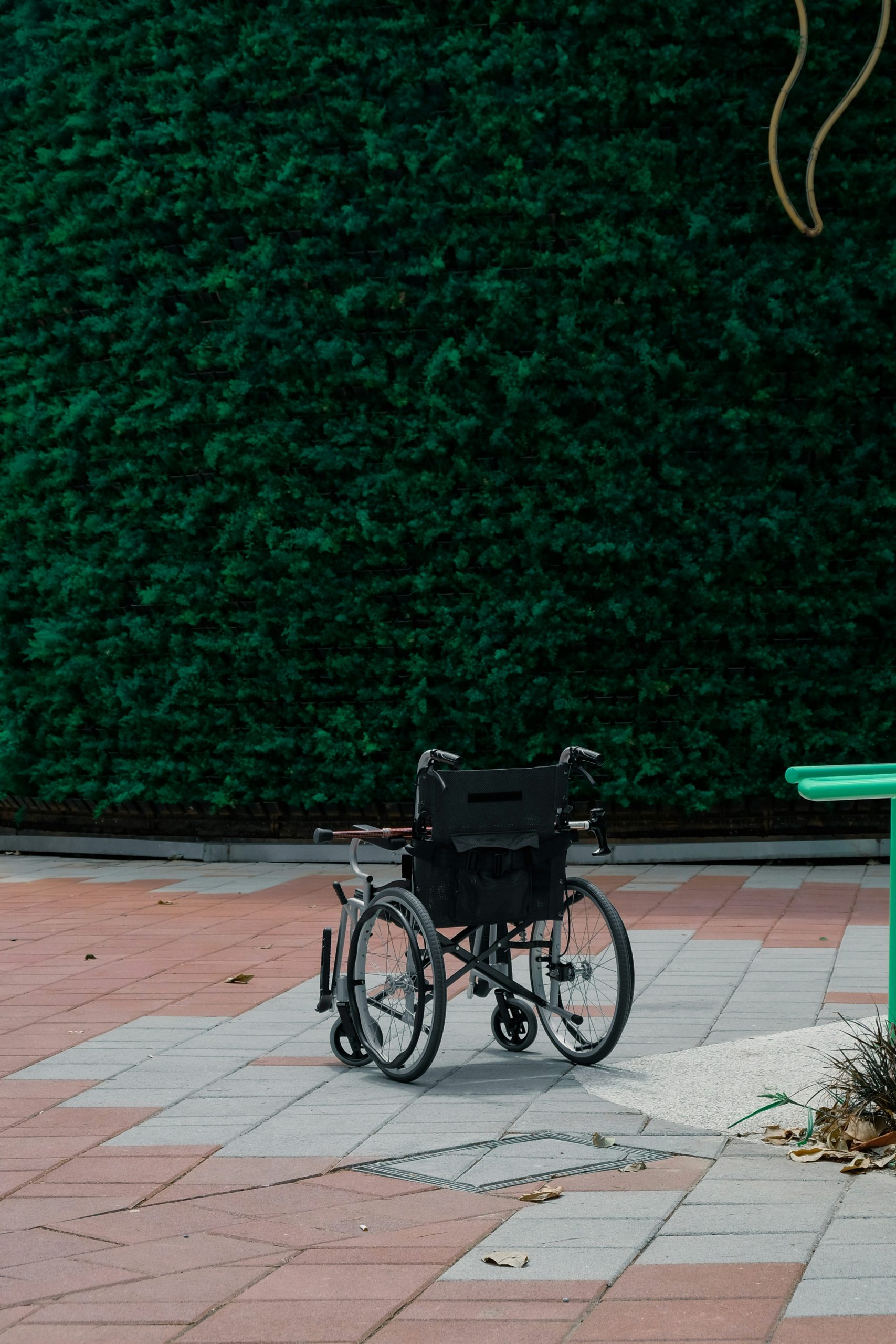This Ramadan, MuslimMatters reached out to our regular (and not-so-regular) crew of writers asking them to share their reflections on various ayahs/surahs of the Quran, ideally with a focus on a specific juz – those that may have impacted them in some specific way or have influenced how they approach both life and deen. While some contributors are well-versed in at least part of the Quranic Sciences, not all necessarily are, but reflect on their choices as a way of illustrating that our Holy Book is approachable from various human perspectives.
Introducing, A Ramadan Quran Journal: A MuslimMatters Series
***
Preparing For Trials And Loss
by Waleed S. Ahmed
The twenty-ninth Juz of the Quran starts with a poignant declaration of one of the fundamental purposes of creation. It states,

“Blessed be He in Whose hands is Dominion, and He over all things hath Power;”
“He Who created Death and Life, that He may try which of you is best in deed: and He is the Exalted in Might, Oft-Forgiving” [Surah Mulk: 67;1-2].
We are reminded in these verses of one of the main reasons we were sent to this world: to be tried and tested. Similarly, in other places in the Quran we are told:
“He is the One who created the heavens and the earth in six days -while His Throne was on water- so that He might test you as to who among you is better in deed…” [Surah Hud: 11;7].
“We will surely test you with something of fear and hunger and a loss of wealth and lives and fruits…” [Surah Al Baqarah: 2;155].
These verses make it clear to us that we are living in the abode of tribulation; that difficulties and hardships are a part of this life. The ‘problem of evil’ thus doesn’t arise for the believer as he is aware that adversity is present in this world by design – and that our ultimate goal is to reach the world of eternal bliss where no tribulation, injustice, or suffering exists. One day is for you and one day is against you – that is the nature of this world.
Reflecting on these verses, a question naturally arises: if tribulations are bound to come our way, then what are we doing to prepare for them? We spend days and weeks stressing over an exam for school and getting ready for it. What then of the trials that the Quran warns us about?
Instead of gleefully going through life hoping that nothing bad ever happens, a more prudent approach is to be prepared for calamity before it strikes. We might be tried with poor health, the loss of employment and wealth, the injury or death of a loved one, heartbreak and the loss of a relationship, a natural disaster, an act of injustice, a war, a sudden accident, an entanglement in an unruly affair such as a legal battle or a toxic work environment; any of these incidents can overnight shatter our worlds and throw us into survival mode. It could happen to any of us.
So, what are we doing to prepare? While there are no simple solutions, this essay hopes to explore some wisdoms from our tradition to be better prepared for the challenging days before they arrive.
Having the Right Mindset
Premodern people were very aware of the notion of living in ‘peacetime’ or ‘wartime’. Peacetime was seen as a temporary period that was to end upon the onset of war, and it was used to train for wartime. This mindset is unfortunately lost upon those of us living in places that have enjoyed a prolonged period of peace, and many of us go through life under the illusion that peacetime is to last forever. More worrisome, is the belief that we are entitled to well-being and any misfortune in life is met with the ‘why me?’ attitude, often accompanied by anger, disillusionment, and complaints.
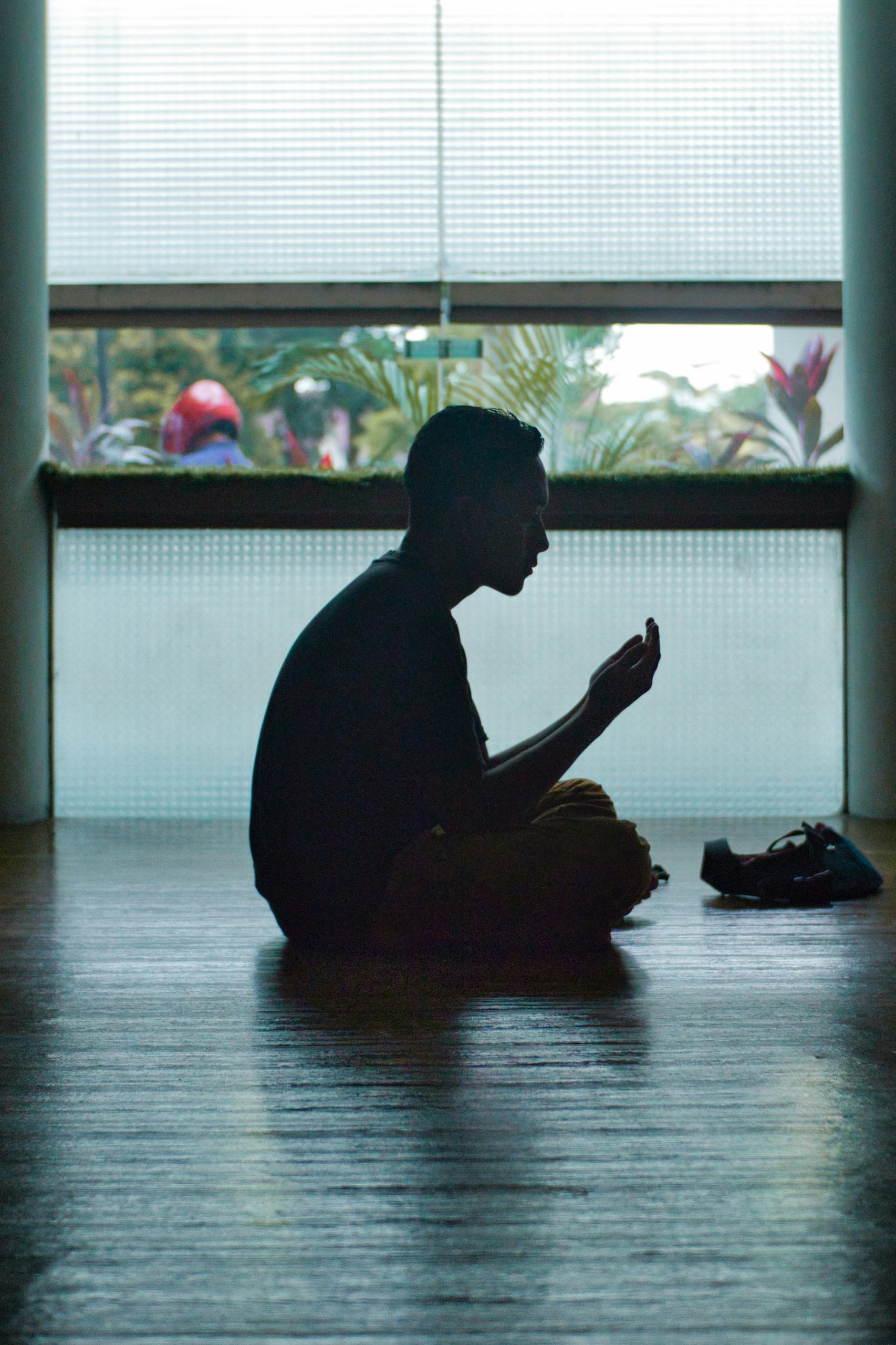
Patience and prayer [PC: Visual Karsa (unsplash)]
However, as already alluded to earlier, the Quran reminds us that we are living in the abode of tribulation and that we will certainly be tried with hardships in our earthly life. For those of us fortunate enough to be living in places away from violent battlefields, wartime for us will entail personal battles and crises that we ought to be ready for. This awareness will ensure that when calamity strikes, our response isn’t ‘Why me?’, but rather one of submission to divine decree and turning to God.
The Prophet  taught us how to live during peacetime so that we are prepared for trials. He said:
taught us how to live during peacetime so that we are prepared for trials. He said:
“Acquaint yourself with Allah in comfortable circumstances, He will acknowledge you in severe difficulty. Know that what has missed you was never going to befall you and what has befallen you was never going to miss you. Know that help is with patience, deliverance is with distress and that with difficulty there is ease” [Ahmed]. In another narration, he mentions, “The pens have been lifted and the pages have dried” [Tirmidi]. [Hadith 19, 40 Hadith an-Nawawi]
This hadith highlights one of the keys to ensuring we are prepared for calamitous times: remembrance of Allah  and being connected with Him during times of ease. Ibn Rajab al Hanbali in his commentary on this hadith says, “When the slave has taqwa of Allah, guards His limits, takes care of His rights when he is in comfortable circumstances, then he has made himself known to Allah by that and there comes into existence between him and his Lord a special recognition ‘ma’rifa’, so that his Lord will acknowledge him when he is in severe difficulty and will take care of him” [Jami’ al-‘Ulum wa al-Hikam].
and being connected with Him during times of ease. Ibn Rajab al Hanbali in his commentary on this hadith says, “When the slave has taqwa of Allah, guards His limits, takes care of His rights when he is in comfortable circumstances, then he has made himself known to Allah by that and there comes into existence between him and his Lord a special recognition ‘ma’rifa’, so that his Lord will acknowledge him when he is in severe difficulty and will take care of him” [Jami’ al-‘Ulum wa al-Hikam].
Having the right mindset also entails rejecting the commonly held ‘why-do-bad-things-happen-to-good-people’ attitude.
The Prophet  taught us that the most difficult trials are those of the righteous. He said, “The people who face the most difficult tests are the prophets, then the righteous, then those following them in degree. A person is tried according to his religion. So if there is firmness in his religion, then the trial is increased, and if there is a weakness, then it is lightened. Verily a trial remains with a servant until he walks the earth having no sin left upon him.” [Sunan Ibn Majah 4023]
taught us that the most difficult trials are those of the righteous. He said, “The people who face the most difficult tests are the prophets, then the righteous, then those following them in degree. A person is tried according to his religion. So if there is firmness in his religion, then the trial is increased, and if there is a weakness, then it is lightened. Verily a trial remains with a servant until he walks the earth having no sin left upon him.” [Sunan Ibn Majah 4023]
The great scholar Abdul Qadir al Jilani explained that the reason for the tribulation is evidenced by the response one has to it: impatience and complaint is a clue that the hardship is a punishment for the individual, patience and obedience is a sign of expiation from sins, and contentment is a sign that the trial is to raise one’s rank with Allah  .
.
The Prophet’s  life is a lesson in dealing with extreme difficulties and hardships. He was an orphan who buried his spouse and five of his six children. He was rejected by his own people and driven from his land. From dealing with wars to poverty, the Prophet
life is a lesson in dealing with extreme difficulties and hardships. He was an orphan who buried his spouse and five of his six children. He was rejected by his own people and driven from his land. From dealing with wars to poverty, the Prophet  showed us how to patiently handle calamities when they strike. Reflection on the tribulations in the Prophet’s
showed us how to patiently handle calamities when they strike. Reflection on the tribulations in the Prophet’s  life is thus one of the main ways of coping with difficulties in our own personal lives.
life is thus one of the main ways of coping with difficulties in our own personal lives.
Understanding the Dunya and Detaching Oneself from It
One of the main causes of severe heartache when experiencing loss is an attachment to this fleeting world and the heedlessness of God. Ibn Ashir in his famous poem states:
“Know that the root of all blight is love of leadership and rejection of the afterlife, and the chief of all faults is love of this world” [Murshid al Mu’een].
Our love and attachment to this world comes from a poor understanding of its nature. The Prophet  taught us that, “This dunya is cursed and what is in it is cursed, except the remembrance of Allah (dhikr) and what is conducive to that, or one who has knowledge or who acquires knowledge” [Jami` at-Tirmidhi 2322].
taught us that, “This dunya is cursed and what is in it is cursed, except the remembrance of Allah (dhikr) and what is conducive to that, or one who has knowledge or who acquires knowledge” [Jami` at-Tirmidhi 2322].
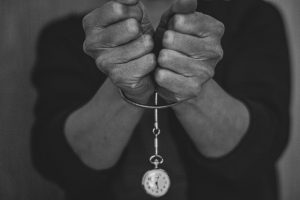
Shackled to life. [PC: Grianghraf (unsplash)]
Early Muslims like Abu Sulayman al-Darani defined dunya as “whatever busies you from Allah  ”. When used in a blameworthy sense, dunya refers to worldliness, and sages like Abu Hamid al Ghazali warned that “dunya is at enmity with Allah
”. When used in a blameworthy sense, dunya refers to worldliness, and sages like Abu Hamid al Ghazali warned that “dunya is at enmity with Allah  and it is at enmity with the awliya of Allah
and it is at enmity with the awliya of Allah  , because it cuts off the path [to Him] for the servants of Allah
, because it cuts off the path [to Him] for the servants of Allah  ” [Ihya ulum al-din].
” [Ihya ulum al-din].
The great gnostic Imam al-Junayd said, “I have taken as an axiom that has enabled me since then to never be disturbed by what afflicts me from this world. And it is this: that the abode of this world is an abode of stress, despondency, tribulation, and strife. And this world—all of it—is wanting (sharr). Its nature is such that it will confront me with everything I detest, and should it meet me with what I love, it is simply abundant grace. And if not, its nature is as was stated.”
Ibn Ata’ Allah in his famous Hikam warns us of the dangers of forming attachments. He states: “You do not love something except that you become its slave and He does not love that you be a slave to other than Him”. He also cautions that, “Whoever does not draw near to God as a result of the caresses of love is shackled to Him with the chains of misfortune.”
Detachment from this temporary world (zuhd) and attachment to the Eternal is therefore one of the best ways to prepare for calamities. The Prophet  advised us to “be in this world as if you were a stranger or traversing a way” [Bukhari]. Ibn Rajab in his commentary explains that the believer should imagine himself to be in a foreign land and this would ensure that “his heart is unattached to the foreign country but on the contrary, his heart attaches itself to the homeland to which he is returning, and so he is only resident in the world to finish the repair of his equipment to return to his homeland” [Jami’ al-‘Ulum wa al-Hikam].
advised us to “be in this world as if you were a stranger or traversing a way” [Bukhari]. Ibn Rajab in his commentary explains that the believer should imagine himself to be in a foreign land and this would ensure that “his heart is unattached to the foreign country but on the contrary, his heart attaches itself to the homeland to which he is returning, and so he is only resident in the world to finish the repair of his equipment to return to his homeland” [Jami’ al-‘Ulum wa al-Hikam].
Build a Fortress of Strength and Stability
In order to deal with the chaos in the outside world, one must have stability at home. In addition to having the right belief system and core values, one should also take pragmatic steps during ‘peacetime’ to build strength in all key aspects of life: physical, financial, emotional, and spiritual. Training actively to strengthen these areas is extremely important as it is well known that under pressure we perform at the level of our base training.
In his book Real Life: Preparing for the 7 Most Challenging Days of Your Life, Dr. Phil McGraw discusses the idea of an ‘adaptability breakdown’ during a crisis. Your adaptability is your ability to handle the demands of your life without falling apart. During a crisis you lose this ability, become overwhelmed, and have difficulty managing the simplest aspects of life. Thus, the stronger you are physically and emotionally, the better you will be at handling a breakdown during adversity.
One of the key ways to building emotional health and avoiding an adaptability breakdown, according to this work, is to reduce ‘stressors’ in one’s day-to-day life. Stressors are things in your daily life that drain you out and put pressure on you mentally and physically. Examples of these include: a long commute, being stuck in daily traffic, noisy neighbors, bickering with your children or spouse, working long hours, and lack of sleep.
This barrage of daily demands that are constantly pecking at you is what leads to stress i.e. the mind and body’s reaction to stressors. The more stressors you have in your life, the more chronically drained your body will be, and the more likely you are to collapse in crises mode. Identifying and eliminating stressors is thus key in ensuring you are in a healthy state before challenging days come your way.
Building healthy relationships, particularly with family, is also an important part of having stability at home. This is one of the reasons families in traditional societies would live close to each other, often in one big house. Strong familial ties serve as a vital coping mechanism in times of distress. Being alone in a crisis is one of the worst situations to be in. Nurturing ties of kinship thus not only serves to fulfill a religious duty for the believer, but also helps strengthen him in this worldly life.
The importance of being spiritually strong and having a connection to God during times of ease was discussed earlier. The primary way of achieving this is by establishing religious routines (wird) and observing them consistently. This has been discussed in more detail in a previous post on purification of the heart.
Seek Help with Prayer and Patience
After warning us about the trials that await us in this life, the Quran immediately tells us of the response of the believer to afflictions:
“Give glad tidings to the patient—those who, when affliction befalls them, say,
“Truly we are God’s and unto Him we return.”
“They are those upon whom come the blessings from their Lord, and compassion, and they are those who are rightly guided” [Surah Al-Baqarah: 2;156–157].
We are taught here that the correct response in any circumstance is turning to God: we are to turn to Him in gratitude in times of ease, and we are to turn to Him with patience in times of distress. We are also reminded to “seek help through patience and prayer. Indeed, Allah is with the patient” [Surah Al-Baqarah: 2;153].
Circumstances are often completely out of one’s control during challenging times which can lead to a sense of complete powerlessness. Focusing on actionable items in one’s realm of control is thus an important coping strategy and prayer should certainly be on top of that list. While it is best to consult a knowledgeable teacher who could advice based on one’s circumstances, following are a few prayers that are suitable to recite for anyone experiencing hardships:
1) Salatul Hajjah: The prayer of need
2) حَسْبُنَا اللَّهُ وَنِعْمَ الْوَكِيلُ [Surah ‘Ali-Imran 3;173]
3) رب اشرح لي صدري، ويسر لي أمري [Surah Taha: 20;25]
4) Surah al-Inshirah [Surah 94]
5) اللَّهُمَّ لَا سَهْلَ إلاَّ مَا جَعَلْتَهُ سَهْلاً، وأنْتَ تَجْعَلُ الحَزْنَ إذَا شِئْتَ سَهْلاً
6) لَا إِلَهَ إِلَّا أَنْتَ سُبْحَانَكَ إِنِّي كُنْتُ مِنَ الظَّالِمِينَ [Surah Al-Anbiya: 21;87]
7) اللَّهُمَّ صَلِّ عَلَى سَيِّدِنَا مَحَمَّدٍ النٌَبِىِّ الأُمِّىِّ وَعَلَى آلِهِ وَصَحبِهِ وَسَلِّم
In summary, trials and tribulations are at the heart of the human experience, and it is our responsibility to ensure we respond to them in a fashion congruent with Prophetic teachings. It is also important this foreknowledge of tribulations does not become a reason for us to have a dismal outlook on life. The Prophet  was always positive, encouraged us to pray for well-being (afiya), and reminded us that God is as the servant thinks of Him. We are also taught to recite every night the last two verses of Surah Baqarah where we ask “ Lord, do not take us to task if we forget or make mistakes. Lord, do not burden us as You burdened those before us. Lord, do not burden us with more than we have strength to bear ” [2;285].
was always positive, encouraged us to pray for well-being (afiya), and reminded us that God is as the servant thinks of Him. We are also taught to recite every night the last two verses of Surah Baqarah where we ask “ Lord, do not take us to task if we forget or make mistakes. Lord, do not burden us as You burdened those before us. Lord, do not burden us with more than we have strength to bear ” [2;285].
The believer thus should always be full of hope, never despair, and always turn back to God. It is appropriate to mention here, in closing this essay, words from the great gnostic Ibn Ata’ Allah:
Let the pain of tribulation be lightened for you by knowing that it is He Most Glorious who is making trial of you.
Related:
– When Problems Have No Solutions: Making Peace With Endless Trials
– The Bigger Picture: Understanding Loss, Sacrifice, and Purpose in Dhul Hijjah
The post A Ramadan Quran Journal: A MuslimMatters Series – [Juz 29] Preparing For Trials And Loss appeared first on MuslimMatters.org.

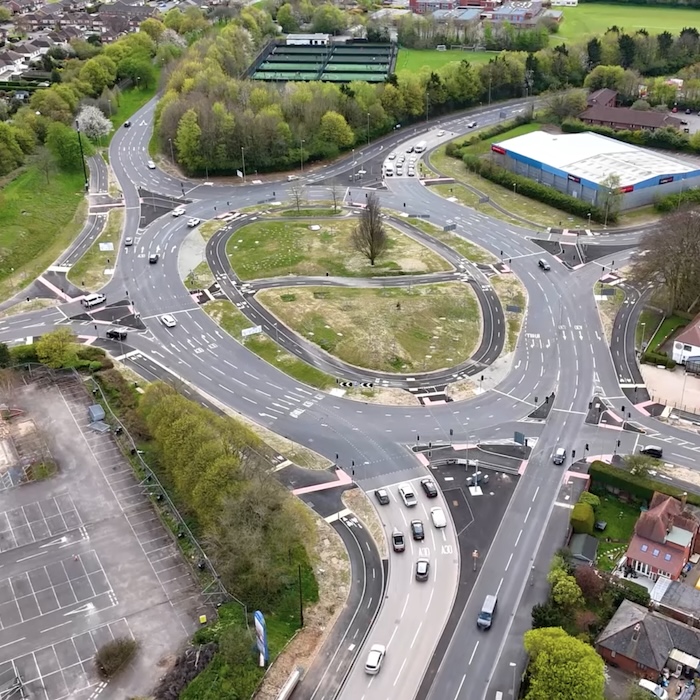 The Brighton Hill Roundabout. (Source:
The Brighton Hill Roundabout. (Source: 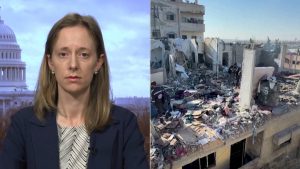

 with Prophet Muhammad
with Prophet Muhammad  . This was when Abdullah
. This was when Abdullah  revealing that our beloved Prophet
revealing that our beloved Prophet 